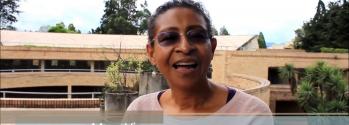Wimbí is a Black Community in the Esmeraldas province of Ecuador. The community lands are under pressure from palm-oil plantations and gold mining, which not only threaten the basis of the local people's livelihoods, but also create ecological degradation. The result is a form of environmental racism that lowers the quality of life for Black people in the region. María Moreno Parra has published an article in an Ecuadorian social science journal about these issues.
The conflict goes back to an informal adjudication of ancestral land which passed into the possession of a community member of Wimbí, who then sold it to an investor from Quito. Subsequently, the lands were quickly transferred to the company Energy & Palma, which currently has the title of ownership of the 1200 hectares in dispute. Conflicts began shortly after the adjudication and illegal sale of land.
In 2016, Energy & Palma filed a lawsuit against four leaders from Wimbí on charges of illegal use of land and land trafficking. The conflict escalated with an attempted eviction of local people in November of that year. A police squad used a mechanical digger to destroy the crops and fences in the disputed lands. Several members of the community came out to face the squad and stop the machinery. The eviction was stopped and the digger taken as a measure of retaliation. Subsequently, the company sued community leaders for the theft of machinery. In August 2017, the company and Wimbí leaders reached an agreement where the community returned the machinery and the company withdrew of the charges of theft. However, the trial for illegal use of land continues. The leaders of Wimbí have been criminalized as thieves and invaders of their own territory; however, they continue to fight for their ancestral right to it.
The conflict between Wimbí and Energy & Palma takes place in a broader context of dispossession of ancestral territories in the province of Esmeraldas, pressured by the interests of the timber industry, oil-palm agroindustry, and gold mining. Along with a substantial loss of forest and ancestral territories of Afro-Ecuadorians and indigenous peoples, gold mining contaminates water and soil with heavy minerals that are toxic to health. These processes expose the local population to daily forms of environmental suffering, in the form of environmental threats that they cannot control and that compromise their health in the short and long run. In addition, in the northern area of Esmeraldas the provision of infrastructure and basic services is limited and deficient. The community of Wimbí, for example, does not have a system of drinking water nor a health center in the community. Access to the community is only through an untarmacked road, transport services are limited and it takes two-and-a-half hours to reach the main city in the province.
The leaders of Wimbí and other communities in the north of Esmeraldas requested precautionary measures, which were initially rejected by of the legal authorities of the province of San Lorenzo. This struggle does not only include the action of the inhabitants of Wimbí, but also involves a series of allies, especially the Apostolic Vicariate and bishop of Esmeraldas. Along with the Vicariate, several communities, including Wimbí, have taken action to protest against the social and environmental effects of mining in the area. In 2011, the communities of Esmeraldas with the support of the Ombudsman's Office managed to get precautionary measures put in place, based on rights to water and to a healthy environment. The Vicariate has also worked with a local university in a series of investigations on water quality in rivers and estuaries affected by mining operations. These studies substantiated the complaints which achieved the precautiuonary measures. In spite of this, mining activities and oil-palm agroindustry continue.



